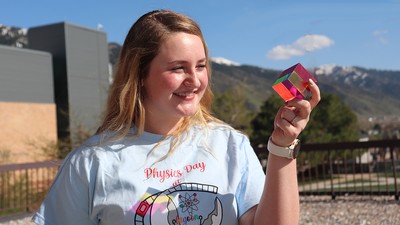Before you rip open a bag of chips or reach for a jelly doughnut, take heed. If you want to lose weight, you’ll have to expend more calories than you take in.
“There’s no way around this equation,” said Utah State University neurobiologist Timothy Gilbertson. “Don’t believe product claims that promise to melt away fat. It’s impossible.”
Gilbertson was featured speaker at USU’s June 13 Sunrise Session held in Salt Lake City. The lecture series showcases efforts of the university’s outstanding researchers to corporate and government leaders in Utah’s population center. At breakfast meetings hosted by corporate sponsors throughout the year, USU scientists share findings of critical research -- much of which will have a sizable impact on Utah’s economy.
June’s gathering was sponsored by Regence BlueCross BlueShield of Utah. Regence CEO Scott Ideson opened the breakfast with the message that university-business partnerships are critical for maintaining our quality of life. “Obesity is no longer a personal battle, but a national health concern,” he said.
Gilbertson, professor and associate head of USU’s Biology Department and a founding member of the university’s nascent Center for Advanced Nutrition, has long studied how the body recognizes and responds to nutrients. His research reveals that certain fats activate receptors in our bodies that make sweet and salty foods taste better.
“Until recently, scientists believed that fat had mouth feel but no taste,” said Gilbertson. “But it does have a taste, which impacts why we choose to eat the foods we do.”
Craving and storing fat was critical for our Paleolithic ancestors’ survival but creates a formidable health challenge in our current era of plentiful food and leisure, he said. Based on studies he’s conducted with rats, Gilbertson believes the more fat we eat the less sensitive our fat receptors become, which causes us to crave even more fat.
In Gilbertson’s experiments with sibling rats, one was given a normal diet and the other a high-fat diet. As expected, the rat that ate more fat became fatter. But when researchers switched the fat rat to a normal diet, the rat, apparently unsatisfied, ate more than her normal weight sister. Months passed before the fat rat reduced her intake.
“We think this has implications for why dieting is so hard for people,” he said.
What about claims that certain people are genetically disposed to obesity?
“Obesity linked directly to genes accounts for only about five percent of cases and about five to seven percent of cases are caused by metabolic disorders,” said Gilbertson.
For the vast majority of people, he said, obesity is caused by lifestyle choices. “We eat too much and exercise too little.”
And the result is alarming. Obesity trends in the United States are spiraling upward. The rest of the world is following suit.
“One in three Americans in now obese, which has serious health consequences,” said Gilbertson. “Obesity places people at direct risk of hypertension, diabetes, heart disease and cancer.”
There’s no magic solution, said Gilbertson, who advocates efforts to educate children at an early age about healthy eating and exercise habits. If children eat a high-fat diet before age 10, he said, “We’re pushing them down the same path as that (fat) rat.”
In August, Gilbertson is joined at the Center for Advanced Nutrition by colleague David York of Louisiana’s Pennington Biomedical Research Center. York, whose research interests include mechanisms that control food intake and nutrient selection, is among the first researchers recruited to Utah State as part of the Utah Science, Technology and Research Initiative. Better known as USTAR, the $220 million program, recently passed by the Utah Legislature, is designed to promote increased scientific research and marketable technological development at the state’s flagship research universities – Utah State and the University of Utah.
USU’s next Sunrise Session, slated for Sept. 28, features researcher Karl White who presents the talk, “Early Identification of Children’s Hearing Loss: A Silent Revolution.” White is internationally recognized as a leading authority on early identification and treatment of hearing loss.
For more information about USU’s Sunrise Sessions, contact Kent Clark, director of corporate and foundation relations, at 435-797-2645 or
kent.clark@usu.edu.









